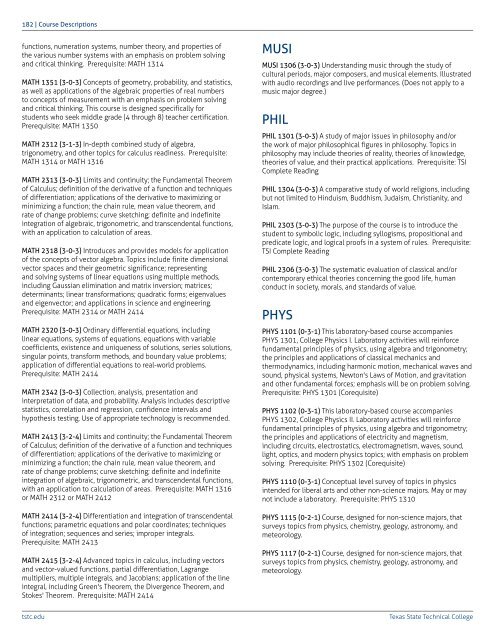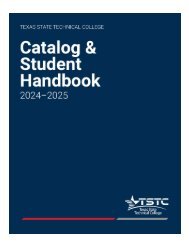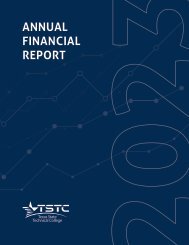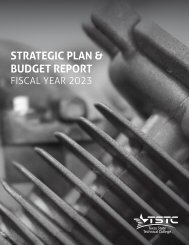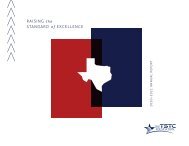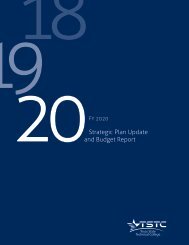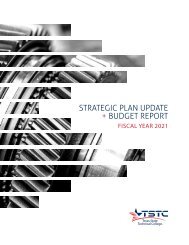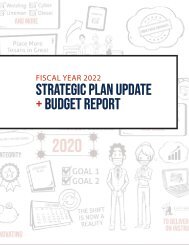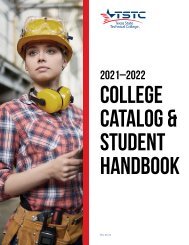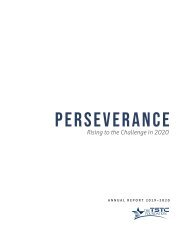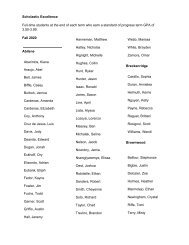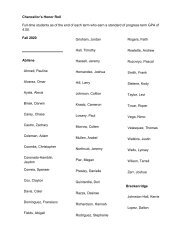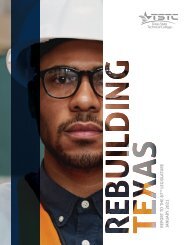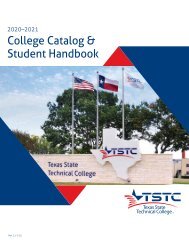Student Handbook and Catalog 2021-22 V2
You also want an ePaper? Increase the reach of your titles
YUMPU automatically turns print PDFs into web optimized ePapers that Google loves.
182 | Course Descriptions<br />
functions, numeration systems, number theory, <strong>and</strong> properties of<br />
the various number systems with an emphasis on problem solving<br />
<strong>and</strong> critical thinking. Prerequisite: MATH 1314<br />
MATH 1351 (3-0-3) Concepts of geometry, probability, <strong>and</strong> statistics,<br />
as well as applications of the algebraic properties of real numbers<br />
to concepts of measurement with an emphasis on problem solving<br />
<strong>and</strong> critical thinking. This course is designed specifically for<br />
students who seek middle grade (4 through 8) teacher certification.<br />
Prerequisite: MATH 1350<br />
MATH 2312 (3-1-3) In-depth combined study of algebra,<br />
trigonometry, <strong>and</strong> other topics for calculus readiness. Prerequisite:<br />
MATH 1314 or MATH 1316<br />
MATH 2313 (3-0-3) Limits <strong>and</strong> continuity; the Fundamental Theorem<br />
of Calculus; definition of the derivative of a function <strong>and</strong> techniques<br />
of differentiation; applications of the derivative to maximizing or<br />
minimizing a function; the chain rule, mean value theorem, <strong>and</strong><br />
rate of change problems; curve sketching; definite <strong>and</strong> indefinite<br />
integration of algebraic, trigonometric, <strong>and</strong> transcendental functions,<br />
with an application to calculation of areas.<br />
MATH 2318 (3-0-3) Introduces <strong>and</strong> provides models for application<br />
of the concepts of vector algebra. Topics include finite dimensional<br />
vector spaces <strong>and</strong> their geometric significance; representing<br />
<strong>and</strong> solving systems of linear equations using multiple methods,<br />
including Gaussian elimination <strong>and</strong> matrix inversion; matrices;<br />
determinants; linear transformations; quadratic forms; eigenvalues<br />
<strong>and</strong> eigenvector; <strong>and</strong> applications in science <strong>and</strong> engineering.<br />
Prerequisite: MATH 2314 or MATH 2414<br />
MATH 2320 (3-0-3) Ordinary differential equations, including<br />
linear equations, systems of equations, equations with variable<br />
coefficients, existence <strong>and</strong> uniqueness of solutions, series solutions,<br />
singular points, transform methods, <strong>and</strong> boundary value problems;<br />
application of differential equations to real-world problems.<br />
Prerequisite: MATH 2414<br />
MATH 2342 (3-0-3) Collection, analysis, presentation <strong>and</strong><br />
interpretation of data, <strong>and</strong> probability. Analysis includes descriptive<br />
statistics, correlation <strong>and</strong> regression, confidence intervals <strong>and</strong><br />
hypothesis testing. Use of appropriate technology is recommended.<br />
MATH 2413 (3-2-4) Limits <strong>and</strong> continuity; the Fundamental Theorem<br />
of Calculus; definition of the derivative of a function <strong>and</strong> techniques<br />
of differentiation; applications of the derivative to maximizing or<br />
minimizing a function; the chain rule, mean value theorem, <strong>and</strong><br />
rate of change problems; curve sketching; definite <strong>and</strong> indefinite<br />
integration of algebraic, trigonometric, <strong>and</strong> transcendental functions,<br />
with an application to calculation of areas. Prerequisite: MATH 1316<br />
or MATH 2312 or MATH 2412<br />
MATH 2414 (3-2-4) Differentiation <strong>and</strong> integration of transcendental<br />
functions; parametric equations <strong>and</strong> polar coordinates; techniques<br />
of integration; sequences <strong>and</strong> series; improper integrals.<br />
Prerequisite: MATH 2413<br />
MATH 2415 (3-2-4) Advanced topics in calculus, including vectors<br />
<strong>and</strong> vector-valued functions, partial differentiation, Lagrange<br />
multipliers, multiple integrals, <strong>and</strong> Jacobians; application of the line<br />
integral, including Green's Theorem, the Divergence Theorem, <strong>and</strong><br />
Stokes' Theorem. Prerequisite: MATH 2414<br />
MUSI<br />
MUSI 1306 (3-0-3) Underst<strong>and</strong>ing music through the study of<br />
cultural periods, major composers, <strong>and</strong> musical elements. Illustrated<br />
with audio recordings <strong>and</strong> live performances. (Does not apply to a<br />
music major degree.)<br />
PHIL<br />
PHIL 1301 (3-0-3) A study of major issues in philosophy <strong>and</strong>/or<br />
the work of major philosophical figures in philosophy. Topics in<br />
philosophy may include theories of reality, theories of knowledge,<br />
theories of value, <strong>and</strong> their practical applications. Prerequisite: TSI<br />
Complete Reading<br />
PHIL 1304 (3-0-3) A comparative study of world religions, including<br />
but not limited to Hinduism, Buddhism, Judaism, Christianity, <strong>and</strong><br />
Islam.<br />
PHIL 2303 (3-0-3) The purpose of the course is to introduce the<br />
student to symbolic logic, including syllogisms, propositional <strong>and</strong><br />
predicate logic, <strong>and</strong> logical proofs in a system of rules. Prerequisite:<br />
TSI Complete Reading<br />
PHIL 2306 (3-0-3) The systematic evaluation of classical <strong>and</strong>/or<br />
contemporary ethical theories concerning the good life, human<br />
conduct in society, morals, <strong>and</strong> st<strong>and</strong>ards of value.<br />
PHYS<br />
PHYS 1101 (0-3-1) This laboratory-based course accompanies<br />
PHYS 1301, College Physics I. Laboratory activities will reinforce<br />
fundamental principles of physics, using algebra <strong>and</strong> trigonometry;<br />
the principles <strong>and</strong> applications of classical mechanics <strong>and</strong><br />
thermodynamics, including harmonic motion, mechanical waves <strong>and</strong><br />
sound, physical systems, Newton's Laws of Motion, <strong>and</strong> gravitation<br />
<strong>and</strong> other fundamental forces; emphasis will be on problem solving.<br />
Prerequisite: PHYS 1301 (Corequisite)<br />
PHYS 1102 (0-3-1) This laboratory-based course accompanies<br />
PHYS 1302, College Physics II. Laboratory activities will reinforce<br />
fundamental principles of physics, using algebra <strong>and</strong> trigonometry;<br />
the principles <strong>and</strong> applications of electricity <strong>and</strong> magnetism,<br />
including circuits, electrostatics, electromagnetism, waves, sound,<br />
light, optics, <strong>and</strong> modern physics topics; with emphasis on problem<br />
solving. Prerequisite: PHYS 1302 (Corequisite)<br />
PHYS 1110 (0-3-1) Conceptual level survey of topics in physics<br />
intended for liberal arts <strong>and</strong> other non-science majors. May or may<br />
not include a laboratory. Prerequisite: PHYS 1310<br />
PHYS 1115 (0-2-1) Course, designed for non-science majors, that<br />
surveys topics from physics, chemistry, geology, astronomy, <strong>and</strong><br />
meteorology.<br />
PHYS 1117 (0-2-1) Course, designed for non-science majors, that<br />
surveys topics from physics, chemistry, geology, astronomy, <strong>and</strong><br />
meteorology.<br />
tstc.edu<br />
Texas State Technical College


